ETH News
All stories that have been tagged with Personalised medicine
A new switch for the cell therapies of the future
News

ETH researchers have developed a new gene switch that can be activated using a commercially available nitroglycerine patch applied to the skin. One day, researchers want to use switches of this kind to trigger cell therapies for various metabolic diseases.
From ETH to clinical practice: medical research requires cooperation
News

Medical research needs unresolved issues from clinical practice, says ETH Zurich Vice President Christian Wolfrum. He explains in an interview how cooperation between ETH research and hospitals can be improved and why ETH intends to pool its activities in medical research.
Separating the physical and psychosocial causes of pain
- News
- Homehero

Not all pain is the same. Depending on the cause, it requires different therapies. A team led by ETH Zurich has now developed a method that enables physicians to better distinguish between physical and psychosocial pain.
Digi, Nano, Bio, Neuro – or why we should care more about converging technologies
- Zukunftsblog
- News
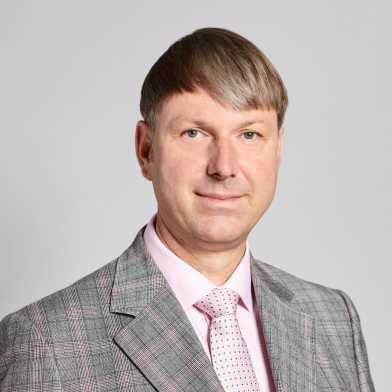
Dirk Helbing expects future digital technologies to penetrate the human body even more in the future. However, he believes that society is not prepared for the risks involved. He puts forward a new legal framework to protect our most intimate data from misuse.
A new direction for cancer research
Globe magazine
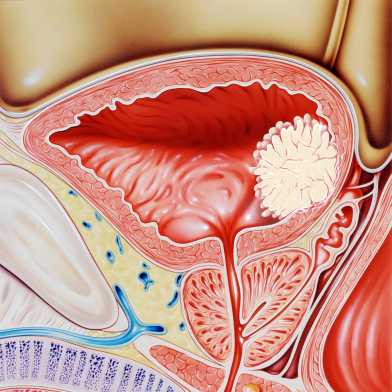
In collaboration with University Hospital Basel, researchers from ETH are investigating the early stages of bladder cancer. Their findings show that future research should also focus on mechanical changes in tumour tissue.
Artificial intelligence detects heart defects in newborns
- Press release
- News

Researchers from ETH Zurich and KUNO Klinik St. Hedwig in Regensburg have developed an algorithm that provides an automatic and reliable method of detecting a certain heart defect in newborns.
A medical degree programme for those who ask why
News
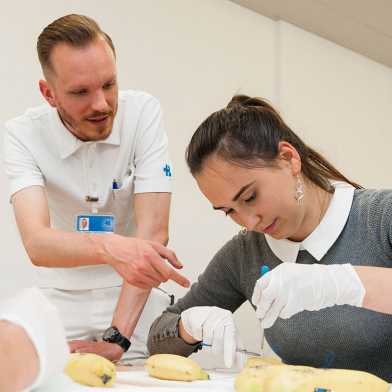
What began as a venture quickly proved its worth: The ETH Bachelor in Human Medicine is well received by graduates and has helped to establish ETH Zurich in the Swiss medical education landscape. In a video, five graduates talk about what makes studying medicine at ETH so special.
In pursuit of sweat
- Globe magazine
- Homehero
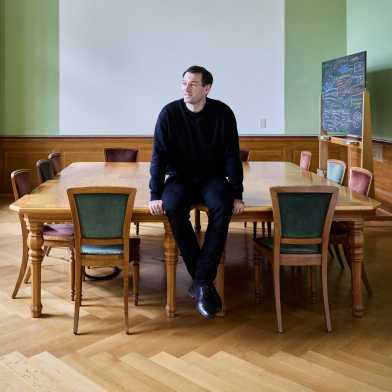
Noé Brasier is fascinated by the emerging field of sweat analysis. He plans to measure the effect of heat stress directly on people’s skin – and help them protect themselves from health risks.
From registered nurse to biomedical engineer
- Globe magazine
- Homehero
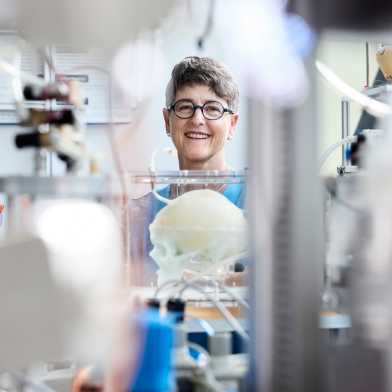
Marianne Schmid Daners was already fascinated by the human-technology interface when she worked as a registered nurse. Since graduating with a degree in mechanical engineering and a doctorate in biomedical engineering, she has been developing biomedical devices for the treatment of heart failure and hydrocephalus.
Advanced Grants for systems biologist and computer scientist
News
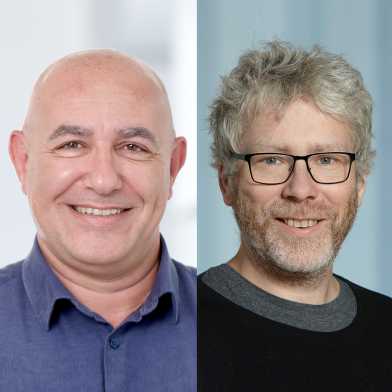
ETH Zurich professors Mustafa Khammash and Marc Pollefeys are each recipients of a prestigious Advanced Grant currently awarded by the Swiss National Science Foundation, rather than the European Research Council.
Unlocking the data treasure chest
- News
- Homepage
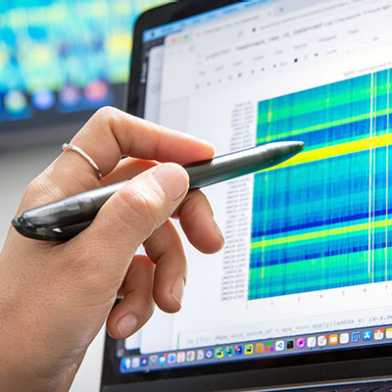
The LOOP Zurich research centre is creating a central platform for the exchange of health data between the University of Zurich, ETH Zurich and the four university hospitals. This will allow data to be utilised quickly and easily to the benefit of patients.
Hope for patients with a severe rare disease
- News
- Homepage
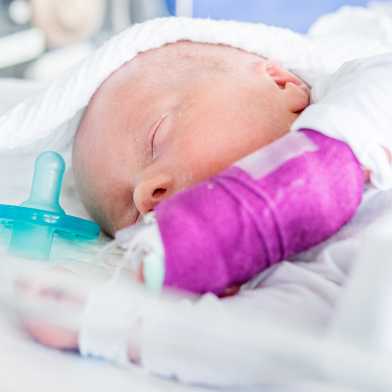
New research offers potential benefits for those affected by the hereditary metabolic disease methylmalonic aciduria. By combining the results of multiple molecular analyses, scientists can better diagnose this rare and severe disease. In the future, an improved understanding of the disease might also improve treatment options.
More Precise Treatment
News
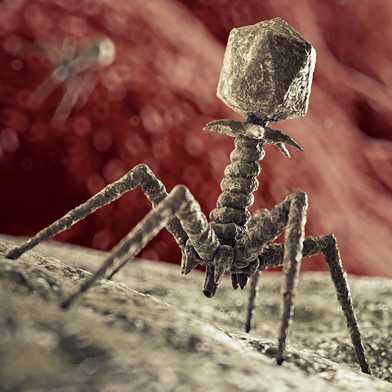
The LOOP Zurich research center combines expertise from ETH Zurich, the University of Zurich and the four university hospitals in Zurich with the aim of developing more personalized therapies. Two new projects supported by The LOOP Zurich target urinary tract infections and obesity respectively.
Biomedical scientist named ETH’s new Vice President for Research
News
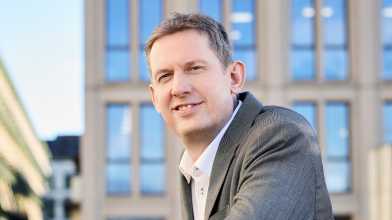
The ETH Board has appointed Christian Wolfrum as Vice President for Research at ETH Zurich effective 1 January 2023. In his roles as Professor of Translational Nutritional Biology, Director of Studies and Associate Vice President for Medicine, Wolfrum has actively shaped medical teaching and research at the university.
Bacteria with recording function capture gut health status
News
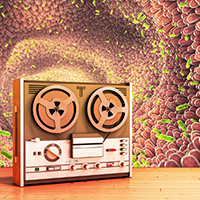
Researchers from ETH Zurich, University Hospital of Bern and the University of Bern have equipped gut bacteria with data logger functionality as a way of monitoring which genes are active in the bacteria. These microorganisms could one day offer a noninvasive means of diagnosing disease or assessing the impact of a diet on health.
Doctoral school picks up speed
News
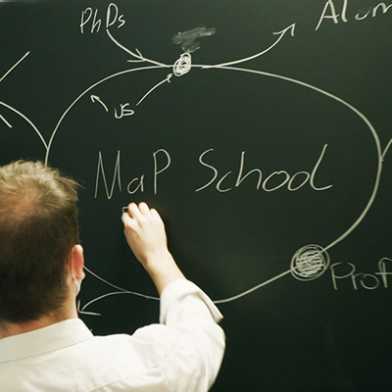
Through its new doctoral programme, the MaP Doctoral School, ETH Zurich plans to train specialists in materials and processes who will work across disciplines to tackle the big challenges of our time, such as climate change, sustainable development and personalised medicine.
Targeted therapies thanks to biomedical informatics
News
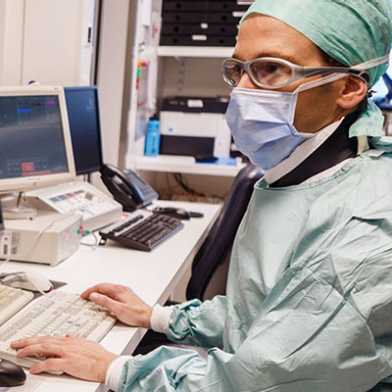
The new “LOOP Zurich - Medical Research Center” promotes patient-focused therapies – for example in oncology and neuro-rehabilitation. To achieve its goals, the center brings together specialist knowledge in the fields of biomedicine, clinical research and bioinformatics from the University of Zurich, ETH Zurich as well as Zurich’s four university hospitals.
Detecting functional changes at the proteome level
News
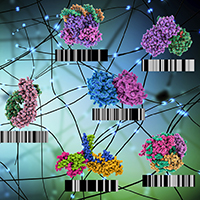
ETH researchers have drastically improved existing proteomics techniques so they can capture all functional alterations in proteins. Their work paves the way for using these signatures as diagnostic tools.
Detailed tumour profiling
News
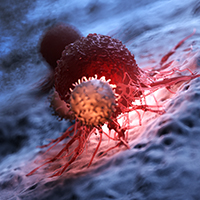
As part of a clinical study involving patients from the University Hospitals in Zurich and Basel, researchers are conducting a thorough and highly precise investigation into the molecular and functional properties of tumours. Their goal is to help physicians to better determine which treatment will best match every patient’s cancer and thus be most effective.
Anti-ageing therapy against metastases
News
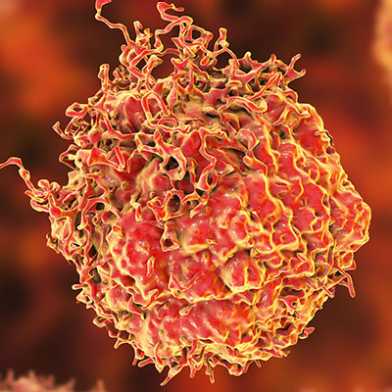
Scientists discovered a genetic factor that determines whether ageing prostate cancer cells either die or become more aggressive. This finding provides important information for personalised therapy of patients.
Understanding mutations at different levels of the cell
News
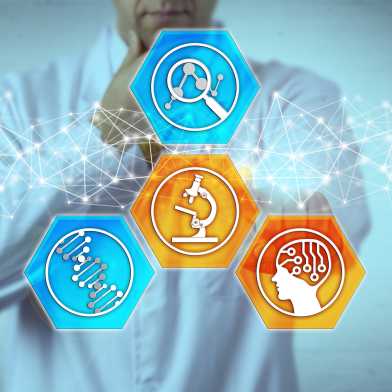
Researchers working under ETH Professor Emeritus Ruedi Aebersold have demonstrated how mutations in a gene influence the structure, function and interaction network of a protein complex. Their work lays a key foundation for personalised medicine.
Prestigious award for pioneer of proteomics
News
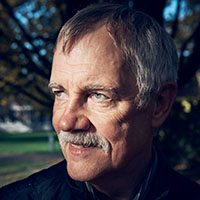
Ruedi Aebersold, a professor of molecular systems biology at ETH Zurich and the University of Zurich, is to receive the Swiss Science Prize Marcel Benoist. Aebersold is being honoured for the part he has played in founding and advancing the field of proteomics, a branch of biology that is seen as the foundation of the personalised medicine of tomorrow.
Foundations for trustworthy artificial intelligence
News

Leading AI researchers from 30 top institutions across Europe are joining forces to form the European AI network ELLIS. Today, it celebrates its launch, with ETH Zurich as a founding member. The ETH Zurich ELLIS Unit is set on establishing the foundations for reliable and trustworthy artificial intelligence.
Putting the users centre stage
Zukunftsblog

Even if we succeed in combatting the COVID crisis, the challenges for the health system will not simply disappear. Digital technologies can be developed to help meet ongoing challenges; Nicole Wenderoth explains what should be borne in mind here.
Mapping the depths of the genome
Globe magazine
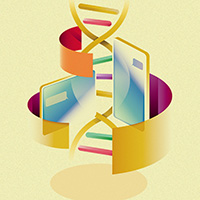
Using algorithms to analyse the whole-genome sequence of a tumour can make treatment more successful – and can even help determine how cells become cancerous.
Data-driven resistance training against muscular atrophy
News

Researchers at ETH Zurich and ZHAW present a simple method to precisely map resistance exercise on machines and record missing comparative figures. This could help to develop optimised training strategies in the future, such as for age-associated muscular atrophy.
The key lies in the genes
Zukunftsblog

Whether or not patients will respond to a drug can be determined in advance. In this way, side effects can be avoided and patients benefit, writes Ernst Hafen.
Using electrical stimulus to regulate genes
- News
- Category
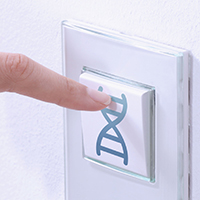
A team of researchers led by ETH professor Martin Fussenegger has succeeded in using an electric current to directly control gene expression for the first time. Their work provides the basis for medical implants that can be switched on and off using electronic devices outside the body.
New universal carrier ink for 3D printing
News
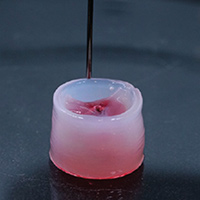
Researchers at ETH have produced a gel from cellulose fibres and biodegradable nanoparticles that liquifies when pressed through the nozzle of a 3D printer, but then quickly returns to its original shape. Their invention paves the way for personalised biomaterial implants.
Maintaining better health

The health care system places a greater emphasis on the treatment of diseases than the root causes of health. On the invitation of the Life Science Zurich (LSZ) Business Network, science, business and society recently discussed this challenge.
A life devoted to protein research
News
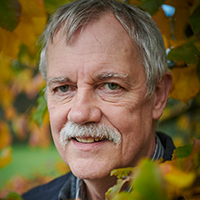
Proteomics pioneer Ruedi Aebersold is retiring soon. Protein analysis was his life’s work, and he paved the way for countless protein researchers around the world.
Major step towards individual cancer immunotherapy
News
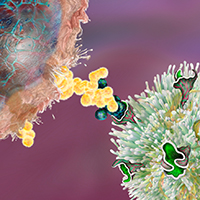
Medicine has great hopes for personalised cancer immunotherapy. The idea is to have a vaccine prompt the immune system to fight a tumour. Scientists at ETH Zurich have developed a method that allows them to determine which molecules are suited to patient-specific immunisation.
“We have succeeded in sharing genetic data across national borders”
News
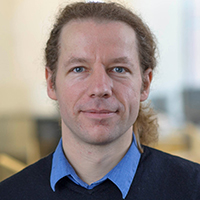
ETH Professor Gunnar Rätsch played a major part in creating the biggest public database for anonymised information on two important breast cancer genes. The database helps to improve the treatment of patients. ETH News spoke with him about the background, his motivation and the challenges such a project presents.
Cholesterol-lowering drugs reduce brown adipose tissue
News
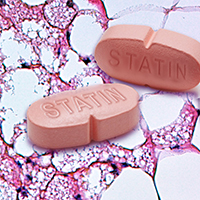
ETH Zurich scientists have shown that statins, one of the most commonly prescribed classes of pharmaceuticals, reduce beneficial brown adipose tissue. But this is no reason to demonise these drugs, the researchers insist.
Getting health data sharing off the ground
News

To make progress in personalised medicine, researchers and doctors need access to health data. However, as a study by ETH researchers shows, comprehensive guidelines for the exchange of such data are lacking, being one of the primary factors why health data are still shared so infrequently.
"Trust is essential"
Globe magazine
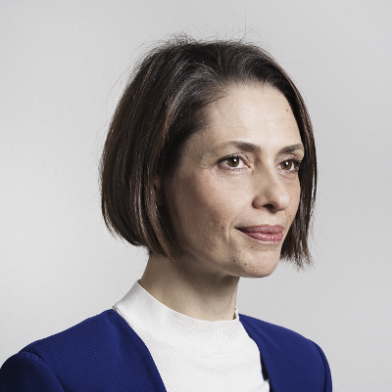
Effy Vayena, Professor of Bioethics, explains why it’s so important to handle personal data fairly, responsibly and transparently in personalised medicine.
“Our goal is now to get closer to the patient”
Globe magazine
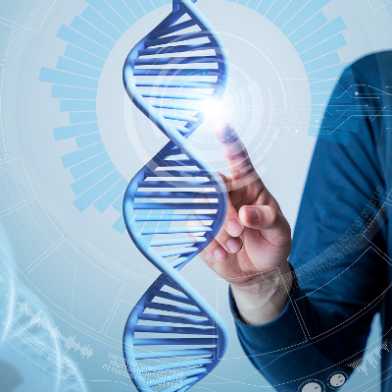
This Friday, two major national initiatives for personalised medicine are launched: Personalized Health Network (SPHN) and Personalized Health and Related Technologies (PHRT). Proteomics pioneer Rudolf Aebersold, metabolism researcher Markus Stoffel and ETH Vice President Detlef Günther discuss the future developments in this field.
Protein analysis for personalised medicine
Globe magazine
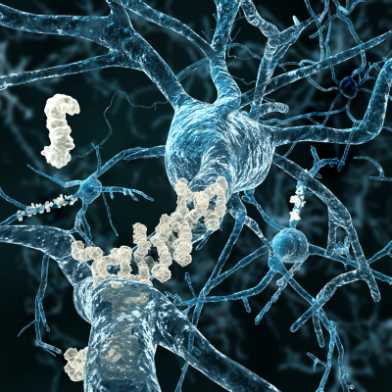
New knowledge about proteins helps researchers develop innovative solutions for clinical practice, for example to the benefit of patients with Parkinsons’s disease.
Many small differences contribute to a large variation
News
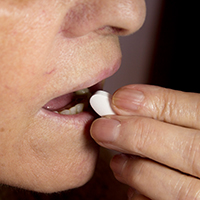
There is no single main reason why certain drugs affect people differently, but rather many small factors. ETH researchers demonstrated this with a model system. They believe that, in order to test the effectiveness of certain drugs, it is necessary to look at the biological system as a whole.
Electronic pills of the future
Zukunftsblog
Martin Fussenegger is convinced that the digital world in which we live will become interlinked with the biological world. He envisages that we will be able to cure diseases with electronic pills in the next 50 years.
Breath instead of a blood test
News
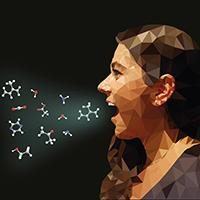
Blow into the tube, please. In the future, the procedure will not just be used by police checking for alcohol intoxication, but also for testing the condition of athletes and for people who want to lose that extra bit of weight. A sensor developed by ETH researchers makes it possible to measure when the body starts burning fat with a convenient breathalyser.
Holograms for molecules
News
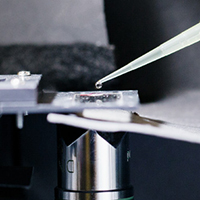
Scientists at ETH Zurich and Roche have developed a completely new method for the analysis of molecules in liquids on a chip. The possible applications of this technology are immense. It has the potential, inter alia, to revolutionise medical diagnostics.
Medicine is awash in data
Globe magazine
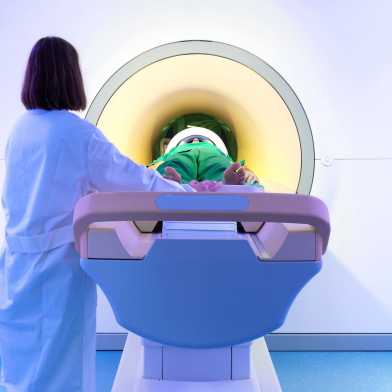
Genomics, digital patient files and real-time health surveillance – never before have we had access to so much health data. Three ETH researchers explain how they extract relevant information from this sea of data and the potential benefits for personalised medicine.
New research tools
News
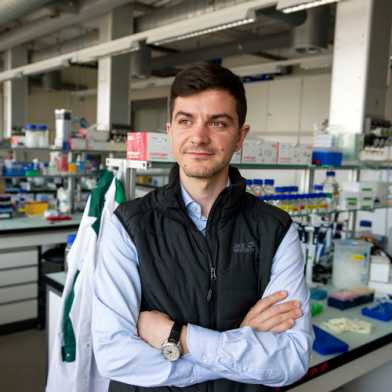
At the age of 29, biotechnologist Randall Platt has already achieved a lot: more than 1,000 research laboratories around the world use a method that he developed. But he is also the family man who recently took on a professorship at ETH.
Revealing how neurons communicate
News
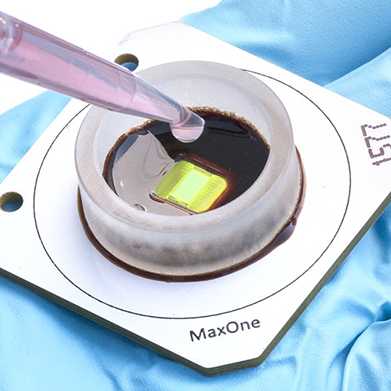
The ETH spinoff MaxWell Biosystems AG develops microelectrode platforms for electrophysiological tests on nerve cells, opening up new possibilities for pharmaceutical research. Now, the company received CHF 130,000 in starting capital from the Venture Kick initiative
New weapon against Diabetes
News
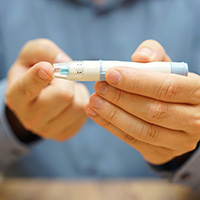
Researchers have used the simplest approach yet to produce artificial beta cells from human kidney cells. Like their natural model, the artificial cells act as both sugar sensors and insulin producers.
Award for innovative cell culture technology
News
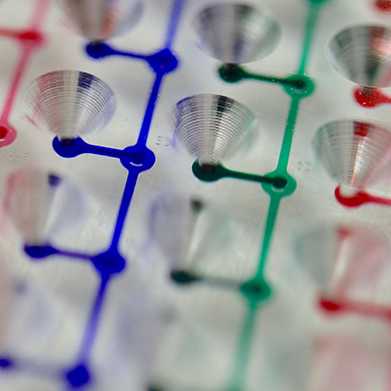
Researchers at ETH Zurich have developed a new cell culture method, which may very well enable to forgo certain tests on animals in the future. The scientists were awarded an international prize for more humane treatment of laboratory animals.
Paving the way for the treatments of the future
News
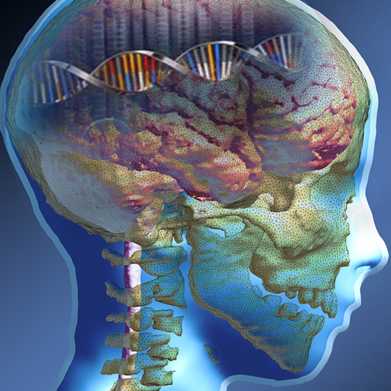
Experts see great opportunities in the field of personalised medicine, but it will require the widespread exchange of patient data. This is one of the key lessons to emerge from this year’s Latsis Symposium at ETH Zurich. The researchers called on politicians to formulate data protection legislation so that it does not hinder progress in the field of personalised medicine.
Quality control for genetic sequencing
News
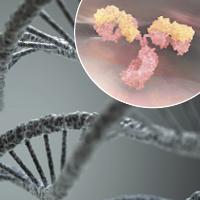
Genetic sequencing is in widespread use today, but until now has not been accurate enough to identify an antibody immune response. Now, thanks to a new control system based on genetic barcodes, the technique is far more reliable – and ready for use in the development of vaccines and antibody drugs.
Fascinating medicine at Treffpunkt Science City
News
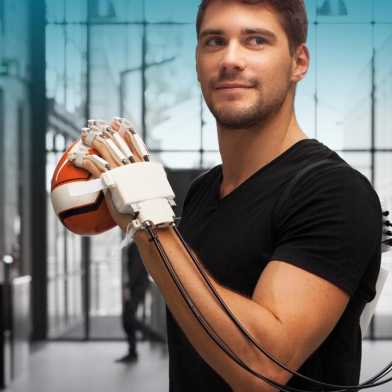
The spring edition of the Treffpunkt Science City series begins next Sunday. The events revolve around the issue of health, and specifically, how the latest advances in research can improve it.
Implant acts as a countermeasure
Press release
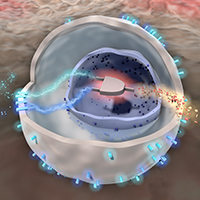
Scientists have developed a new, more complex type of genetic circuit, which has enabled them to successfully treat psoriasis, a chronic inflammatory skin condition, in the mouse model.
MicroRNAs are digested, not absorbed
News

There has been a lot of controversy in recent years over the issue of whether exogenous microRNA molecules can be absorbed from food and even have a physiological effect. A new study by ETH professor Markus Stoffel using mouse models settles the question by demonstrating that the posited dietary uptake does not take place. This questions the potentially promising concept of creating functional foods based on microRNAs.
Investing in the future of D-BSSE
News

The Department of Biosystems Science and Engineering (D-BSSE) at ETH Zurich in Basel and the University of Basel are looking to expand their collaboration. The cantons of Basel-Stadt and Basel-Landschaft are investing a total of CHF 10 million with a view to strengthening their collaboration in the field of personalised medicine and implementing new infrastructure measures.
6 professors at ETH Zurich appointed
News

At its meeting of 8/9 July 2015, the ETH Board appointed six professors at ETH Zurich in accordance with the application submitted by ETH Zurich President Lino Guzzella.
Brilliant spark for personalised therapies
News
The 2015 Spark Award goes to a group of researchers led by ETH Professor Manfred Kopf, which has developed a method by which specific characteristics of immune cells can be identified. The technology could prove to be an important tool in personalised medicine.
Nanomedicine pioneer Mauro Ferrari at ETH Zurich
News
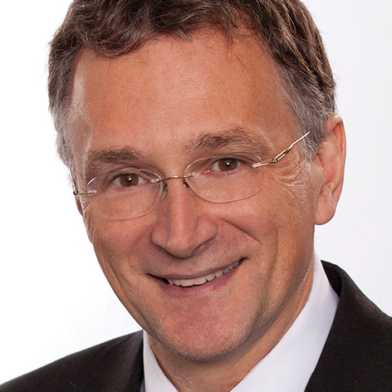
Every year, the Department of Mechanical and Process Engineering (D-MAVT) awards the Aurel Stodola Medal to an outstanding scientist in the discipline. Mauro Ferrari, who researches and teaches in the field of nanomedicine at Houston Methodist Hospital in Texas, is honoured this year. He will speak about his research on April 1 at ETH Zurich.
Nose made by bioprinters
Globe magazine
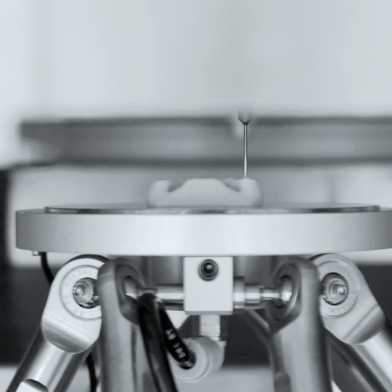
3D printers are opening up new opportunities in medicine too. A group of researchers in a team led by Marcy Zenobi-Wong is printing cartilage transplants using the body’s own cells. They are personalised and grow with the patient.
Personalising medicine with proteins
News
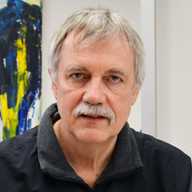
Ruedi Aebersold, Professor of Systems Biology, is one of the world’s leading researchers in proteomics. In the last few years, he has developed the proteomics method together with a team of international researchers to such an extent that doctors and clinical researchers can now use this technique as a tool. In an interview with ETH News, the professor at ETH Zurich and the University of Zurich explains how information from proteins can advance what is commonly known as personalised medicine.
Science to aid independence in old age
News

ETH Zurich is taking part in EIT Health, a new major EU research programme. As part of the project, more than 140 European companies and research institutes are developing solutions for problems in the field of health and old age.
ETH and University of Zurich launch Wyss Translational Center Zurich
Press release
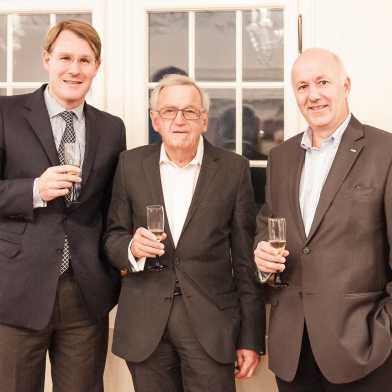
ETH Zurich and the University of Zurich are founding a new translational research centre at the interface of medicine, science and engineering: the Wyss Translational Center Zurich. A USD 120 million donation from Dr. h.c. mult. Hansjörg Wyss to the two Zurich universities is making this possible. Through an interdisciplinary approach, the new centre aims to accelerate the development and application of innovative medical therapies and groundbreaking robotic systems.
“We still have much to achieve”
News
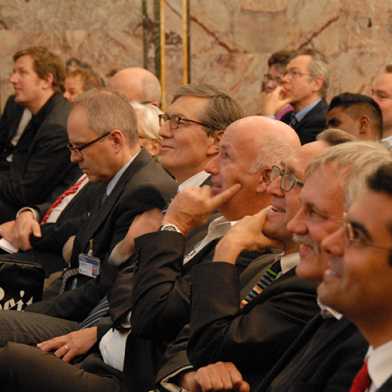
“Hochschulmedizin Zürich”, a partner association of ETH Zurich, the University of Zurich and the university hospitals, was founded three years ago. At its annual conference, the partners presented the achievements of their strengthened collaboration, along with some promising new projects for the future.
New competence centre for personalised medicine in Zurich
News
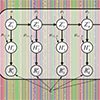
DNA sequencing has revolutionised life sciences. Now it’s medicine’s turn: thanks to genetic analysis, treatment tailored to individual patients will be a standard feature in the future. With a new competence centre, ETH Zurich and the University of Zurich are aiming to lead the way in personalised medicine.